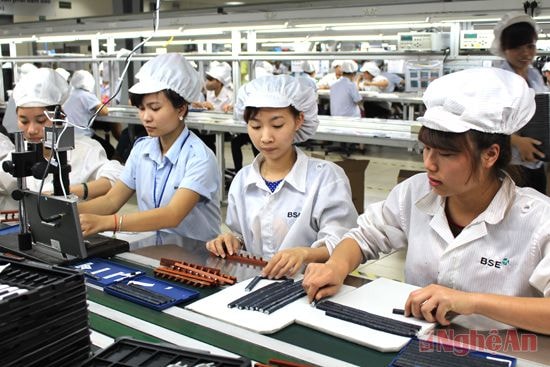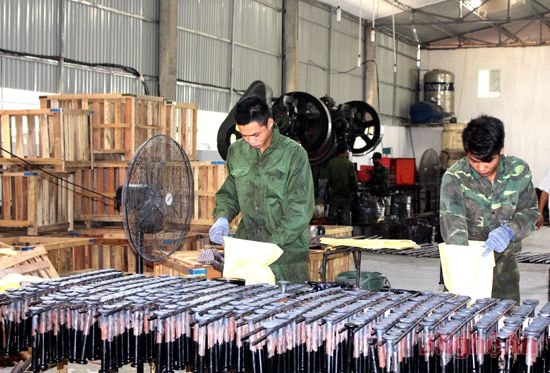Those who seek the promised land
(Baonghean) - Over the past years, labor export has been the right direction to solve the employment needs of people across the country in general and in Nghe An in particular. "Labor-attracting" markets such as Malaysia, Taiwan, Korea, Japan, Middle Eastern countries... are places with developed manufacturing industries, high labor demand, becoming attractive destinations for labor export activities.
In addition to traditional, key markets such as Taiwan and Malaysia, in recent years, Korea has gradually demonstrated its potential to become a "promised land" for young men and women of working age who want to find stable jobs, have a regular source of income to send home to their families and save for the future. Despite the common goal, among those who have been and are in Korea, each person has a different situation, a different story, a different choice and behavior. Some people follow labor discipline well and have their contracts renewed by their employers, but there are also people who defy the law, do not return home on time and become illegal workers...
Confessions of the dark and light corners
Mr. Nguyen Van Q. (Nghi Quang commune, Nghi Loc district) went to South Korea to work at the end of 1999 under a training program (at that time the EPS program had not yet been implemented), with a 3-year contract and a salary equivalent to 400 USD/month at a company specializing in manufacturing fire protection systems. However, in 2003, when the deadline to return home was approaching, with the thought of "earning some more accumulated capital", he was enticed and enticed, and became an illegal resident in South Korea, switching to work as a worker at a small factory. 7 years of living and working against the law, was also the same amount of time he was worried about being discovered and deported by the local authorities. Therefore, he limited his travel, almost did not contact or communicate with people, and lived a relatively isolated life. He sadly recalled that it was his inferiority complex about his own behavior that prevented him from doing many things as planned, such as enrolling in Korean language courses to improve his foreign language skills. In 2010, he was discovered and brought back to his country, ending the days of having to "illegally stay" in the land of kimchi for personal gain.
 |
| Workers returning from overseas can apply to work at Korean companies (in photo: Assembling electronic components at the BSE factory). Photo: Chau Lan |
Another story of a worker who strictly followed the discipline and labor contract of his Korean employer is Mr. Nguyen Huu Hiep (born in 1987), hamlet 3, Thanh Hung commune, Thanh Chuong district. In March 2010, he entered Vocational School No. 4 in Vinh city to study Korean. After completing a short-term foreign language training course and passing the KLPT Korean proficiency test, Mr. Hiep was facilitated by the school staff to complete the paperwork to export to the Korean labor market in April 2011. According to the contract, he worked at a wire manufacturing company in the central region of the kimchi land, and has been "loyal" to the company for 4 years and 4 months.
He frankly shared: "In general, Vietnamese workers are considered by Korean employers to be smarter, more diligent and hardworking than workers from other markets, so it is understandable that companies extend contracts with Vietnamese workers." Of course, on the condition that workers must have "exemplary" behavior and attitude, such as ensuring stability and not changing jobs during their time living in Korea. As for the CBT group of workers, meaning working for 2 or more companies, if they return home on time and pass a Korean language proficiency test, and complete their application, they can continue to return to Korea to live and work 6 months later.
 |
| Elevator components manufacturing at Strong plus Elevater Viet Han Company (Nghi Phu Industrial Park, Vinh City). Photo: Chau Lan |
Thus, most of the workers in Nghe An in particular and Vietnam in general in the Korean market are aware that not complying with the labor contract is an incorrect action. However, due to the small immediate benefits, or due to lack of courage, unstable stance and viewpoint, being lured and enticed, a part of the workers find the option of "living illegally", "working illegally", creating dark corners both literally - isolated life, little communication with the outside and also figuratively - creating negative prejudices of Korean employers towards Vietnamese workers. That is also the reason why the Korean side has to strengthen the management and handling of Vietnamese workers who do not comply with the law, invisibly drawing a barrier to the exit opportunities of many other workers.
Return from the promised land
Experiencing life in Korea with many happy and sad memories, Vietnamese workers returning home not only bring with them a little bit of accumulated capital but also countless baggage. After being deported, Mr. Q. decided to return to his hometown to live and do business. He and his wife opened a seafood restaurant on Nguyen Xi street, not far from Cua Lo beach, serving a rich menu, including dishes with a strong Korean flavor. The restaurant's name "Yeng Chi", which is also the name given to the couple's first daughter, is the pronunciation of "lingzhi", the name of a famous rare mushroom in Korea. Dotted in Mr. Q.'s current life are still small corners that remind him of the place where he had a long time of attachment.
Among them, what impressed him most was the industrial working style of Korean people: "They are conscious of going early and coming home a little late to ensure that they do not cut working time according to regulations, clearly distinguish between working time and break time, do not talk privately, do not answer the phone while working, etc." He affirmed that labor discipline in the working environment in Korea is extremely strict, and is one of the top requirements of employers for unskilled workers. Mr. Q. confided: "That period of time completely changed my perception of many aspects of life, of lifestyle, of behavior. At the same time, living and working in a country with a high level of development in infrastructure, services as well as civilized and friendly lifestyle of the local people... is an opportunity for me to be motivated to apply what I have learned when I return home, contributing to building my homeland."
Mr. Nguyen Huu Hiep said: “Accumulating capital for the future is one thing, from another perspective I feel more mature from the simplest things learned when away from home, being independent and adapting to the environment here. In case the contract does not extend, I will return home on time, contributing to building a good image of Vietnamese workers. With the “assets” accumulated in your country, I believe it will not be difficult to find a job in my homeland, especially, more and more Korean enterprises are investing in Nghe An”.
Commenting on Nghe An workers going to foreign markets in general and Korea in particular, Mr. Dang Cao Thang, Deputy Director of the Department of Labor, Invalids and Social Affairs directly in charge of labor export, said: “Vietnamese workers in general and Nghe An in particular are very eager to go to work abroad. In the context of integration, the door to the international market is increasingly opening with the needs and aspirations of domestic and provincial workers to get rich and start a business. Particularly for Korea, this is an open market with high recruitment needs, especially the input labor level is not the first priority, but the issue they care about is labor discipline. However, due to the relatively high rate of workers not wanting to return home and staying illegally, recently the Korean market has been somewhat stricter in terms of legal procedures. In fact, the rate of Nghe An workers staying illegally is not high compared to the national average, but it needs to be promoted. Strengthen propaganda and ideological work to raise awareness of workers in complying with labor discipline and legal regulations of the host country. This will create a good image of Nghe An workers in particular and Vietnamese workers in general in the international labor market.
Objectively speaking, the cooperation program to send Vietnamese workers to work in Korea not only contributes positively to the provincial economy through the remittances sent by workers. In a longer-term vision, the modern industrial environment of Korea has a positive impact on the skill level and, above all, the awareness, style and thinking of workers. Returning from the "promised lands", they bring with them new and modern ways of thinking and working to start a business in their homeland. Or, they themselves will be "magnets" that attract foreign businesses and investors to Nghe An. Thus, there has been an exchange of human and material flows in two directions: export and import. We "export" the "raw" labor force, which vaguely reflects the old thinking of the manual, small and medium-sized economy, to receive a labor force with certain training and with innovative thinking and style in the industrial way. Along with that are valuable investment and development opportunities from the international community, bringing modern knowledge and opportunities to improve and perfect the infrastructure system for the developing economy. That is the basic principle and also the greatest benefit that we receive in the integration process, first of all the ASEAN community, the continent and beyond.
Thu Giang






